
PHYTOCOENOLOGIA
Scope & Guideline
Illuminating the Science of Plant Interactions
Introduction
Aims and Scopes
- Phytosociological Research:
The journal emphasizes detailed studies of plant communities, including their composition, structure, and distribution across various ecosystems. - Ecological Dynamics and Environmental Drivers:
Research often explores how environmental factors such as climate, soil, and land use impact vegetation patterns and community dynamics. - Conservation and Habitat Modelling:
Contributions frequently address conservation issues, assessing habitat suitability and the implications of climate change on plant communities. - Vegetation-Environment Relationships:
Studies investigate the interactions between vegetation types and their environmental contexts, providing insights into ecosystem functioning. - Functional Traits and Community Assembly:
The journal also highlights research on functional traits of plant species and how these traits influence community structure and resilience.
Trending and Emerging
- Climate Change Impact Studies:
There is a notable increase in research assessing the effects of climate change on plant habitats and species distributions, emphasizing the urgency of conservation efforts. - Diversity and Structure of Ecosystems:
Recent studies are increasingly focusing on the diversity and structural complexity of ecosystems, particularly in fragmented habitats and changing landscapes. - Longitudinal Studies on Vegetation Dynamics:
Emerging themes include long-term studies on plant community dynamics, which provide valuable insights into ecological trends over time. - Functional Trait Analysis:
Research on the functional traits of plant communities is gaining traction, highlighting their role in ecosystem services and resilience. - Urban and Agricultural Landscape Ecology:
There is a growing interest in the vegetation dynamics within urban and agricultural contexts, examining how these landscapes influence biodiversity.
Declining or Waning
- Monoculture and Agricultural Studies:
Research specifically focused on monoculture impacts on plant diversity has become less frequent, indicating a potential shift towards more complex ecological interactions. - Halophytic and Littoral Vegetation Studies:
While previously a focus area, studies on halophytic and coastal vegetation seem to be diminishing, possibly as researchers explore more diverse ecosystems. - Regional Vegetation Surveys:
There appears to be a reduced emphasis on broad regional vegetation surveys, with a trend towards more localized and detailed ecological studies.
Similar Journals
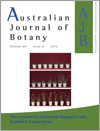
AUSTRALIAN JOURNAL OF BOTANY
Fostering innovation in plant biology and conservation.The Australian Journal of Botany is a prestigious peer-reviewed journal published by CSIRO PUBLISHING, dedicated to advancing the field of plant sciences and ecology. Established in 1953, this journal provides a critical platform for researchers to share original research findings, reviews, and perspectives in subjects ranging from plant biology to ecological interactions, with a focus on Australian flora and its conservation. With an impressive impact factor and categorized in the Q3 quartile in both Ecology, Evolution, Behavior and Systematics and Plant Science, the journal ranks competitively within its fields, allowing authors to reach a diverse audience of professionals, students, and fellow researchers. The journal is accessible in print and electronically through its ISSN: 0067-1924 and E-ISSN: 1444-9862, providing wider access to vital research outcomes that influence environmental policies and natural resource management. As it aspires towards innovation and excellence, the Australian Journal of Botany remains an essential resource for those passionate about the richness of plant biodiversity and ecological understanding.
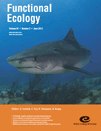
FUNCTIONAL ECOLOGY
Bridging Theory and Application in Functional EcologyFUNCTIONAL ECOLOGY is a premier journal published by WILEY that delves into the intricate relationships of organisms and their environments, addressing key themes in ecology, evolution, behavior, and systematics. Established in 1987, this influential publication has made strides in both foundational research and applied science, boasting a remarkable impact factor that positions it in the Q1 category for Ecology, Evolution, Behavior, and Systematics. With a Scopus ranking of #48 out of 721 in its field, it represents the cutting edge of ecological research, appealing to a diverse audience that includes researchers, professionals, and students striving to comprehend and address ecological challenges. Although the journal does not currently provide Open Access options, it remains a vital resource for those looking to deepen their understanding of functional ecology and its practical applications in sustainability and conservation. Join the community of scholars advancing ecological knowledge and its relevance in today's rapidly changing world.
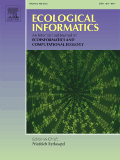
Ecological Informatics
Bridging ecology and informatics for a sustainable future.Ecological Informatics is a premier journal published by Elsevier, dedicated to advancing the interdisciplinary fields of ecology and informatics since its inception in 2006. With its ISSN 1574-9541 and E-ISSN 1878-0512, this Netherlands-based journal has established itself as a leading platform for high-quality research, reflected in its impressive Q1 rankings across multiple categories including Applied Mathematics, Computational Theory, Ecology, and Ecological Modeling, showcasing its critical role in shaping scientific discourse in these important domains. The journal ranks in the top percentiles for various fields: for instance, it stands at rank #26/635 in Applied Mathematics and #8/41 in Ecological Modeling according to Scopus. Though it currently does not offer open access options, its commitment to publishing impactful studies underscores its significance to researchers, professionals, and students interested in ecological and computational methodologies. Researchers in these fields are encouraged to explore and contribute to this respected journal as it continues to inspire innovative solutions for ecological challenges.
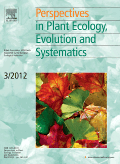
PERSPECTIVES IN PLANT ECOLOGY EVOLUTION AND SYSTEMATICS
Fostering Dialogue in Plant Science ResearchPERSPECTIVES IN PLANT ECOLOGY, EVOLUTION AND SYSTEMATICS is a premier scientific journal published by Elsevier GmbH, dedicated to advancing knowledge and understanding in the fields of plant ecology, evolution, and systematics. With an impressive impact factor and a solid reputation within the top quartile (Q1) of both Ecology and Plant Science categories, this journal ranks among the elite, positioned 100th out of 721 journals in its field, reflecting its significant contribution to ongoing research and academic dialogue. Established in 1998 and converging through to 2024, this journal not only serves as a crucial platform for researchers, professionals, and students alike but also emphasizes innovative methodologies and interdisciplinary approaches to address pressing environmental issues. Although it follows a traditional access model, the wealth of rigorous peer-reviewed articles available will engage the scientific community and facilitate advancements in understanding plant diversity and ecological interactions.

OIKOS
Advancing ecological knowledge for a sustainable future.OIKOS is a leading journal dedicated to the field of Ecology, Evolution, Behavior, and Systematics, published by WILEY in the United Kingdom. Since its inception in 1973, OIKOS has established itself as a vital platform for researchers seeking to advance their understanding of ecological interactions and evolutionary processes, with its impact reflected in its prestigious Q1 classification in the 2023 Scopus rankings. The journal's dedication to high-quality research is exemplified by its robust ranking of #106 out of 721 in the relevant categories, situating it within the top 15% of journals globally. With a commitment to disseminating influential findings, OIKOS encourages the open exchange of ideas among a diverse range of scholars, making it an essential resource for academics, professionals, and students alike. Whether you are interested in innovative ecological theories or applied research with real-world implications, OIKOS provides a rich repository of knowledge to inform and inspire your work.

NORDIC JOURNAL OF BOTANY
Unveiling Nature's Secrets through Rigorous InquiryNORDIC JOURNAL OF BOTANY, published by WILEY, is a distinguished journal that serves as a vital platform for the dissemination of innovative research in the fields of Plant Science and Ecology, Evolution, Behavior and Systematics. With an ISSN of 0107-055X and E-ISSN 1756-1051, this journal has been a crucial part of the academic landscape since its inception in 1981, continuing to contribute significantly to the literature up to 2024. NORDIC JOURNAL OF BOTANY holds a commendable Q2 ranking in Plant Science and Q3 in Ecology, which underscores its impact and relevance in the scientific community. Despite the absence of Open Access options, the journal offers robust access features that ensure researchers and readers can easily engage with its meticulously curated content. Aimed at both seasoned professionals and emerging scholars, the journal not only publishes high-quality articles but also fosters collaboration and knowledge exchange across various related disciplines, thereby solidifying its role as a cornerstone in botanical and ecological research.

ECOGRAPHY
Enhancing Understanding of Life's InterconnectednessECOGRAPHY, published by WILEY, stands at the forefront of ecological and evolutionary research, with an impressive Impact Factor reflecting its esteemed position in the Q1 category of Ecology, Evolution, Behavior, and Systematics. Operating since 1978 and transitioning to a fully Open Access model in 2020, the journal is dedicated to disseminating high-quality research that influences conservation practices and enhances our understanding of ecological dynamics. With an ISSN of 0906-7590 and an E-ISSN of 1600-0587, ECOGRAPHY has garnered a remarkable placement in Scopus rankings, being in the top 4% of its category, achieving an impressive rank of #27 out of 721 in Agricultural and Biological Sciences. Academics from around the globe benefit from the research published in this journal, which seeks to engage and inspire further exploration of ecological systems. For inquiries, ECOGRAPHY can be reached at their UK address: 111 River St, Hoboken 07030-5774, NJ.

Hacquetia
Cultivating Understanding in Ecology and SystematicsHacquetia is an esteemed open-access journal dedicated to the interdisciplinary exploration of ecology, evolution, behavior, systematics, forestry, and plant science. Published by SCIENTO since 2007, this journal has established itself as a pivotal platform for researchers and academics looking to disseminate their findings in these critical fields. Nestled in the heart of Warsaw, Poland, Hacquetia offers unrestricted access to its content, promoting knowledge sharing among professionals, students, and enthusiasts alike. The journal, while ranked in the Q4 category across its relevant disciplines in 2023, serves as a valuable resource for those seeking to contribute to and engage with contemporary ecological and botanical research. Its commitment to open access ensures that cutting-edge research is available to a global audience, fostering innovation and collaboration in the scientific community.
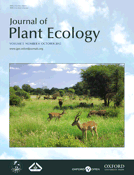
Journal of Plant Ecology
Pioneering Research in Plant Interactions and BiodiversityJournal of Plant Ecology, published by Oxford University Press, is a premier journal dedicated to advancing the scientific understanding of plant ecology. With an ISSN of 1752-9921 and an E-ISSN of 1752-993X, this journal has established itself as a leading resource in the field, maintaining a prestigious Q1 ranking across multiple categories in the 2023 Scopus rankings, including Ecology, Evolution, Behavior and Systematics and Plant Science. The journal's commitment to high-quality research is underscored by its influence in agricultural and biological sciences, reflected in its competitive percentiles. While currently not offering open access, its comprehensive scope spans various ecological issues critical to understanding plant interactions and ecosystems, making it an essential read for researchers, educators, and students alike. The Journal of Plant Ecology not only facilitates the dissemination of vital findings but also fosters collaboration within the global scientific community. Discover more about the latest innovative research and key developments in plant ecology, and contribute to the dialogue that shapes our understanding of environmental stewardship and biodiversity conservation.
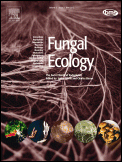
Fungal Ecology
Pioneering Insights into Fungal Interactions and EcologyFungal Ecology, published by Elsevier Science Ltd, is a leading international journal dedicated to the exploration and advancement of our understanding of fungal biology and its ecological significance. With an impressive impact factor and recognized in the second quartile (Q2) across various categories such as Ecological Modeling, Ecology, Ecology, Evolution, Behavior and Systematics, and Plant Science, this journal offers a critical platform for researchers and professionals to disseminate and discuss innovations in fungal ecology. Since its inception in 2008, the journal has built a solid reputation, particularly highlighted by its impressive Scopus rankings, including a top percentile status in ecological fields. Researchers are encouraged to submit their findings that contribute to the understanding of the ecological roles of fungi, their interactions within ecosystems, and their applications in environmental science. Although the journal does not offer open access, it remains a vital resource for academics and practitioners aiming to stay ahead in the rapidly evolving fields of fungal research and ecology. Located in the vibrant heart of the Netherlands, the journal continues to foster scholarly engagement and collaboration among scientists globally.